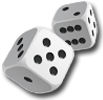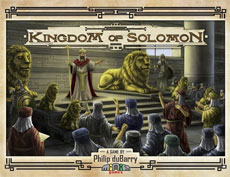



play board games
Board game reviews, strategy tips & session reports
Kingdom of Solomon Review
 Stats:
Stats:
No. of players: 2-4
Amount of time to play: 60-90 minutes
Age requirements: 12+
Set-up time: 5 minutes
Kingdom of Solomon Rules Description:
Kingdom of Solomon is a worker placement game set in Isreal during Solomon’s reign. You must gather resources to build structures and score victory points.
Each round you’ll place your pawns on regions of the map, action spaces or a bonus space. You place pawns one at a time in player order and only one pawn may be on each space. Pawns placed on regions of the map get you resources. Available action spaces allow you to steal a resource from an opponent, gain an extra resource from a region, or exchange one resource for another. Bonus spaces are powerful and move you to the front of the player order, get you three fortune cards or additional resources. When you place a pawn on a bonus space you must place all that you have left.
During the resolution phase you will remove all your pawns and take the resources and actions associated with each.
Now that you have gathered resources you can sell them or buy others at the market. The currency in the market is victory points and this phase happens in reverse player order.
The building phase allows each player to build one building, roads and to construct the temple. Buildings give you victory points, allow you to place a building token on the map and grant you their action. Once you have placed a building token in a region other players may no longer access it.
Roads connect map regions where you have a building token with regions that produce resources. When you place a pawn in a region you also get resources from the regions connected to it by your roads.
Different parts of the temple require different resources to build. When you build a section of the temple you gain either a temple token or victory points. If you have the most temple tokens you gain access to the high priest. The high priest allows you to place one of your pawns on an opponent’s region. You will get to use their roads and gather resources just as they do. Also the player that controls the high priest gets 20 victory points at the end of the game.
Through different means you may gain fortune cards. These cards grant you victory points and resources.
The game ends once all map regions with a space for a building token are filled, one player places all their building tokens or the temple is finished. You then score the bonus points for the high priest and each resource you have is worth one victory point. You win if you have the most victory points.
A Quick Kingdom of Solomon Review:
Kingdom of Solomon is a medium-weight worker placement game that is not too complex and plays fairly quickly. You should be able to teach this to friends pretty easily and they should get it in just a couple rounds. The play time is nice as many worker placement games take long to play. Kingdom of Solomon moves along at a good pace and finishes in a timely manner.
Although there is nothing new in the game, the decision to take a bonus space must be considered. If you wait too long you might not get it. Too early and you may use more pawns then you want to.
The components are pretty good but I really wish there were more temple tokens. A couple other people in my group wished there were colored roads, making it easier to see which roads belonged to which buildings. I wish the box fit the board better and there were more baggies to separate the bits.
The rules also are a bit hard to follow in a couple places. The section about building roads is not under the building phase and the rules don’t mention how many roads you may build and when you may build them. Once you have played a few rounds things are pretty straightforward and none of the rules issues make the game too tough to play.
In spite of these small flaws Kingdom of Solomon has solid gameplay and mechanics. It is an easy to teach worker placement game with a decent play time. Although it is not especially groundbreaking Kingdom of Solomon can fill a nice niche in your collection.
Score and synopsis: (Click here for an explanation of these review categories.)
Strategy 4 out of 6
Luck 3 out of 6
Player Interaction 4 out of 6
Replay Value 3 out of 6
Complexity 3 out of 6
Fun 4 out of 6
Overall 4 out of 6

Leave a Reply